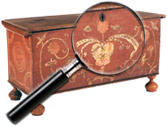Franz Josef Kline (American, 1910 to 1962)
A major figure in Abstract Expressionism, Franz Kline was born in Wilkes-Barre, Pennsylvania, in 1910. Kline was a student in painting and drawing at Boston University before moving to London to study illustration and drafting at the Heatherley School of Fine Art. In 1939 he moved from London to New York City, where he exhibited interiors and cityscapes painted in a representational mode. These works were characterized by calligraphic, rapid brushwork which reflected the frenetic rhythms of urban life. His output at the time included portraits and murals commissioned for the Cedar Tavern, the famous locus for Abstract Expressionists and Beat poets. This period made possible the innovations which would follow; “The early figurative paintings contain the seeds of everything later.”[1]
By the mid-1940s representationalism gave way to more abstracted forms in Kline’s work, a process notably catalyzed through the influence of Willem de Kooning, who magnified Kline’s ink drawings with a projector so as to emphasize the dramatic gesture of the brushstrokes. Enlarging the dynamic qualities of his sketches to a monumental scale, Kline continued to work primarily in black and white, using housepainter’s brushes. The ensuing canvases prompted comparisons to oriental calligraphy, an influence the artist denied, explaining that the inspiration for his paintings, while never referenced literally, was the contemporary New York scene. Kline taught at The Pratt Institute in Brooklyn and Black Mountain College in North Carolina, and was an influential presence for the subsequent generation of Abstract Expressionist artists.
JNW
[1] Art View; Franz Kline-a Legacy in Black and White (The New York Times, January 19, 1986)
Information courtesy of Shannon’s Fine Art Auctioneers, April 2012.
